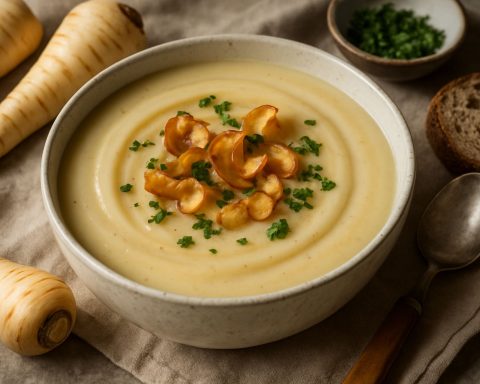Baba Ganoush is a beloved Middle Eastern dish that has traveled far beyond its native lands. This flavorful eggplant dip is not only a staple of Lebanese and Syrian cuisine but has also made its mark across the globe. Its origin dates back centuries, with name “baba ganoush” believed to mean “pampered papa” in Arabic, suggesting its indulgent nature. Creamy and smoky, with a subtle hint of garlic and a tangy zest, it is perfect for any occasion, from cozy family dinners to elegant dinner parties.
Ingredients:
– 2 medium-sized eggplants
– ¼ cup tahini
– 2 tablespoons fresh lemon juice
– 2 cloves garlic, minced
– 2 tablespoons olive oil
– Salt and pepper to taste
– Fresh parsley, chopped (for garnish)
– Pomegranate seeds (optional, for garnish)
Instructions:
1. Preheat Your Oven: Set the oven to 400°F (200°C) to get it ready for roasting.
2. Prepare the Eggplants: Prick the eggplants in several places with a fork and place them on a baking sheet.
3. Roast: Place in the preheated oven for 30-40 minutes until the eggplants have collapsed and the skins are charred.
4. Cool and Scoop: Allow the eggplants to cool. Then, scoop out the soft flesh into a mixing bowl, discarding the skin.
5. Blend Ingredients: Add tahini, lemon juice, garlic, and olive oil to the bowl. Mash with a fork or blend for a smoother texture.
6. Season to Taste: Add salt and pepper, adjusting according to your preference.
7. Serve: Transfer to a serving dish, drizzle with olive oil, and garnish with parsley or pomegranate seeds.
Enjoy Baba Ganoush with warm pita, fresh veggies, or as a delightful side dish!
The Nutritional Wonders of Baba Ganoush: A Middle Eastern Delight
Baba Ganoush, a cherished culinary tradition hailing from the Middle East, offers not only an explosion of flavors but also a plethora of health benefits owing to its rich, wholesome ingredients. By understanding the nutritional makeup of this delectable eggplant dip, you can fully appreciate its favorable effects on health and well-being.
Eggplants: The Vitamin-Packed Base
At the heart of Baba Ganoush lies the eggplant—a vegetable renowned for its low-calorie content and high nutritional value. Rich in antioxidants, particularly nasunin found in the skin, eggplants act as powerful agents in protecting the body against oxidative stress and potential cellular damage. They are also a good source of dietary fiber, promoting digestive health and aiding in maintaining a healthy weight. Additionally, its moderate potassium content is beneficial for heart health, helping to maintain a stable blood pressure level.
Tahini: The Calcium-Rich Creaminess
Tahini, made from ground sesame seeds, contributes a creamy texture and nutty flavor, while being a nutritional powerhouse. Rich in healthy fats and amino acids, tahini is high in calcium and other essential minerals like magnesium and zinc. These nutrients are crucial for maintaining strong bones and improving metabolic functions. The healthy fats from tahini are also beneficial in reducing cholesterol levels, supporting heart health, and providing a sustained source of energy.
Lemon Juice: The Immunity Booster
The addition of fresh lemon juice not only imparts a tangy zest to Baba Ganoush but also infuses it with Vitamin C, a crucial nutrient for immune health. The antioxidants in lemons help to neutralize free radicals in the body, reducing inflammation and fortifying the body’s natural defenses. Lemon juice also aids in digestion and assists in the body’s detoxification processes.
Garlic: The Heart-Healthy Herb
Garlic, often hailed as a superfood, brings numerous health benefits to Baba Ganoush. Its active compound, allicin, is known for its ability to lower blood pressure and cholesterol levels, thus promoting cardiovascular health. Garlic’s antimicrobial properties also support the immune system, making it beneficial during cold and flu season.
Olive Oil: The Healthy Fat
Drizzling olive oil over Baba Ganoush adds not only richness but also essential healthy fats, mainly monounsaturated fats. These fats are known to reduce inflammation and have been linked to a decreased risk of chronic diseases, such as heart disease. Olive oil also boasts antioxidant properties that further bolster the dip’s healthfulness.
Flavorful Garnishes: Parsley and Pomegranate Seeds
Lastly, garnishing with fresh parsley introduces a fragrant herbal note along with a variety of vitamins and antioxidants, while optional pomegranate seeds contribute a burst of sweetness alongside added antioxidants and Vitamin C. These garnishes not only amplify the visual appeal but also enhance the dish’s nutritional profile.
Incorporating Baba Ganoush into your meals is a delightful way to enjoy a flavorful, nutrient-rich dish that aligns indulgence with well-being. Whether served with warm pita, fresh vegetables, or enjoyed as a standalone dip, Baba Ganoush is a testament to the health-enhancing properties of natural, wholesome ingredients.
Why Baba Ganoush is the Ultimate Dip: New Trends and How to Perfect It
Baba Ganoush has transcended its traditional roots, becoming a global culinary sensation. With a growing trend towards plant-based diets and a heightened interest in Middle Eastern flavors, this classic eggplant dip is experiencing a renaissance. Here’s an in-depth look at the latest trends, insights, and ways to make the most of Baba Ganoush.
Latest Trends in Baba Ganoush
1. Plant-Based Movement: With an increasing number of people switching to plant-based diets, Baba Ganoush is gaining popularity for its vegan-friendly ingredients. The dip offers a delicious alternative to dairy-based spreads, appealing to those seeking healthier options.
2. Fusion Cuisines: Chefs around the world are experimenting with fusion dishes, incorporating Baba Ganoush into various cuisines. From Mediterranean-style pizzas to innovative taco fillings, the dip’s versatility makes it a favorite among food enthusiasts.
3. Sustainability Focus: Ethically sourced ingredients and sustainable cooking practices are more important than ever. Baba Ganoush, made from simple, natural components, aligns perfectly with this growing priority in the culinary world.
How-to Perfect Your Homemade Baba Ganoush
Creating the perfect Baba Ganoush at home requires attention to a few key details:
– Eggplant Selection: Opt for firm, shiny eggplants with smooth skin. These are fresher and will yield a creamier texture.
– Char for Flavor: Don’t rush the roasting process. Achieving that signature smoky flavor depends on allowing the eggplants to char and collapse fully.
– Balance of Ingredients: Adjust the tahini, lemon juice, and garlic to suit personal tastes. Start with the recommended amounts and tweak to achieve your ideal flavor profile.
Insights and Innovations
– Flavor Infusions: Some chefs are experimenting with adding smoked paprika or sumac to enhance the smoky flavors. Others are infusing olive oil with herbs like thyme and rosemary for a unique twist.
– Serving Suggestions: While traditional serving methods involve pairing Baba Ganoush with pita, try offering it with a selection of crisp vegetable sticks, or as a topping for grilled meats and fish.
Pros and Cons of Baba Ganoush
Pros:
– Nutrient-Rich: Packed with fiber, vitamins, and antioxidants.
– Versatile: Works as a dip, spread, or accompaniment to a wide range of dishes.
– Diet-Friendly: Suitable for vegan, gluten-free, and keto diets.
Cons:
– Caloric Density: Contains tahini and olive oil, which can be high in calories if consumed in large quantities.
– Preparation Time: Roasting eggplants can be time-consuming.
Sustainable Practices
When making Baba Ganoush, consider using locally sourced and organic eggplants to reduce your carbon footprint. This not only promotes sustainability but also supports local farmers.
Conclusion and Predictions
As the world continues to explore and embrace diverse flavors, Baba Ganoush is poised to become a staple in more kitchens globally. Its adaptability and health benefits make it ideal for contemporary food trends, ensuring its presence in the culinary spotlight for years to come.
For more about global culinary trends, visit AllRecipes and explore a world of flavors waiting to be discovered.








